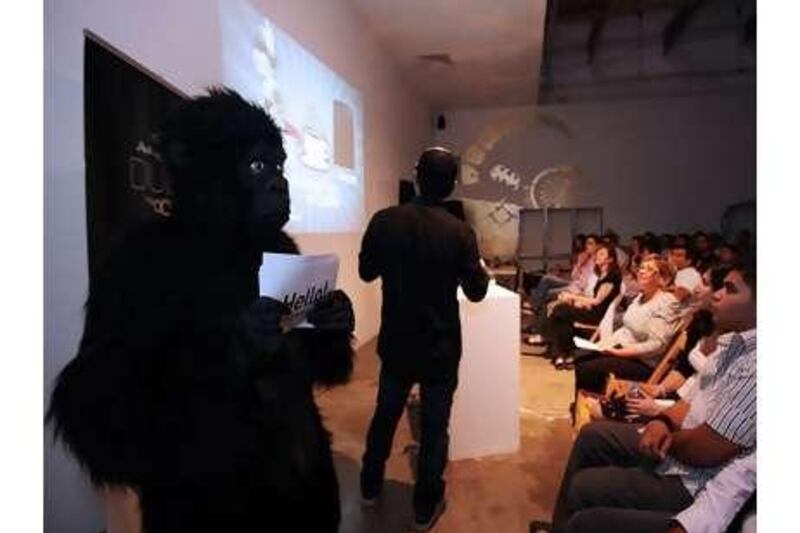DUBAI // The image of Mahmoud, a young Palestinian child who lost his eyes to a phosphorus bomb, appeared on the screen and Dr Ali Dabbagh, a Dubai-based ophthalmologist, had 20 seconds to describe its significance. A few minutes later and Muhammed Ali Jamadar was using his 20 seconds to explain the demographics of the radio listeners in the UAE. It was part of a unique night called Pecha Kucha, a Japanese concept, in which members of the community give short and snappy presentations on a wide variety of topics.
Each presenter has 20 images and is allowed 20 seconds to explain each one. The subject can be anything supported by visual images with a cultural perspective. Last Wednesday night, the 10 presenters speaking to an audience of over 300 were a comedian, a journalist, a student radio presenter, an installation artist, a spoken word poet, a group of graphic designers, a theatre group, a humanitarian, a musical collaboration and a social networking initiative.
Hosted every four months at the Third Line Gallery, based in Al Quoz 3, in collaboration with Traffic, a design studio, and Sauce, a fashion boutique, it unites people in an informal and socially productive way. Tarane Ali Khan, media manager for the Third Line, said it was ideal for the cultural landscape of Dubai. "We wanted to provide a forum for people to come and share their ideas. The point is there are people from different backgrounds sat next to each other and hearing about topics they may have never considered. It creates another element to the original format of the event."
Pecha Kucha was founded in Tokyo in 2003 by two architects who wanted to bring people to their design space. They invited people to show their work and kept the format precise and concise so the night would be fast-paced and entertaining. The Japanese words Pecha Kucha derive from the sound of conversation and are the equivalent in English of chitchat, hence the idea to get people talking. The night was so successful that the concept began spreading by word of mouth. It is now held every quarter in Dubai and over 230 other cities globally.
Mr Jamadar, 22, who was talking about his online student radio station Campus Radio ME, said he enjoyed the experience. "I've only been once before and I thought it was an arty idea but it turned out it was for many different kinds of people. It was interesting and I think it was a success for the radio station. We met people we'd like to work with and we raised awareness levels. However, I would have liked more audience interaction."
The format of Pecha Kucha is such that each presenter speaks directly after the other so as to keep the pace of the conversation. Ms Ali Khan said many fruitful meetings had sprung from the night. "The best thing about it is you don't have to be a professional or involved in the art scene to come to Pecha Kucha. People interact and mingle and many positive networks have been formed." Rollan Rodriguez, 33, a member of the Brown Monkeys, a graphic design collective who gave a presentation on their visual art graffiti, said the event was special: "It's a major way to connect with other people." @Email:aseaman@thenational.ae






